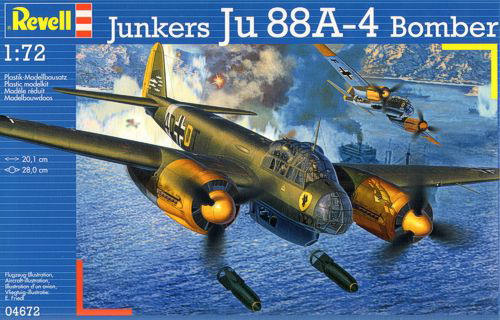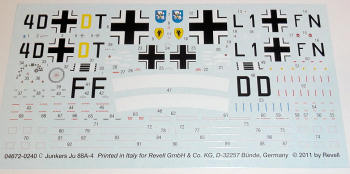
| KIT #: | 04672 |
| PRICE: |
EUR 17,95 in shops in the Eurozone |
| DECALS: | Two options |
| REVIEWER: | Sander Roubos |
| NOTES: |

| HISTORY |
The Ju88
is probably the most versatile aircraft the Luftwaffe had at its disposal during
the war. Developed as a medium bomber, it was faster than many fighters when it
first came into service. Although not available in large numbers when the war
started, production levels soon increased and at the end of the 1944 when
production ceased, over 15,000 aircraft had been manufactured. Not only did the
plane see service as a conventional bomber, it was also used as a dive bomber,
night fighter, mine layer, remote controlled bomb and had lots of other duties
over its impressive career.
| THE KIT |
 Revell
have done an impressive job on this one, replacing their previous and ancient
tooling. The parts count stays just south of 200 (although the count on the
sprues runs up to 247). Lots to do for your 17 quid! Detail is excellent and
consists of finely engraved panel lines. There is no flash on any of the parts.
The cockpit is beautifully rendered in no less than 26 parts, and lots of it
will be visible through the large greenhouse which encapsulates it. I can't
comment on fit but all Revell kits from the last ten years have good to
excellent fit, so to me this isn't an area of concern.
Revell
have done an impressive job on this one, replacing their previous and ancient
tooling. The parts count stays just south of 200 (although the count on the
sprues runs up to 247). Lots to do for your 17 quid! Detail is excellent and
consists of finely engraved panel lines. There is no flash on any of the parts.
The cockpit is beautifully rendered in no less than 26 parts, and lots of it
will be visible through the large greenhouse which encapsulates it. I can't
comment on fit but all Revell kits from the last ten years have good to
excellent fit, so to me this isn't an area of concern.
Transparencies are covered by three sprues. They are very clear and relatively
thin, and the framing is slightly highlighted, which should make masking easier
for those choosing to go the manual way (I'm sure Eduard will release one of
their Express masks shortly).
From the
kit layout and sprue breakdown it is obvious that this A-4 version is only the
first in a line of Ju88s. The cockpit section, tail and wingtips are separate
subassemblies. This also means that option-wise there isn't much to choose from,
Revell has left that to future boxings. Two different seats are on offer
although Revell does not indicate which should go with which color scheme. The
kit can be built with its gear down or up. For the hardpoints under the wing
root four 250kg bombs and two 500kg bombs are provided. Two color schemes are
offered, one for a plane from KG30 operating out of
The
manual is typical Revell: Printed on recycled paper, thankfully in normal
booklet form this time and clear enough to follow. Color callouts naturally only
in Revell's own color system, but RLM references are included (they have you mix
three colors to get these - why doesn't a German company have RLM colors in its
program?).
 When I
compare this kit to the Hasegawa kit I have in my stash, it comes out quite
favorably. The Revell kit has the edge in cockpit detail which is absolutely
excellent for an injection-moulded kit. Hasegawa is no slouch here but it all
looks a bit more Spartan inside. The Hasegawa kit wins on surface detail: It is
slightly more petite and shows more rivets (in a restrained way). I haven't
tested fit on either model but since both manufacturers have an excellent record
here I suspect there isn't much to worry about in that regard. You get two
versions with the Revell kit, while Hasegawa offers three. Of course, Revell
wins hands-down when it comes to price. You can get two kits for the price of a
single Hasegawa offering and leave the shop with money to spare.
When I
compare this kit to the Hasegawa kit I have in my stash, it comes out quite
favorably. The Revell kit has the edge in cockpit detail which is absolutely
excellent for an injection-moulded kit. Hasegawa is no slouch here but it all
looks a bit more Spartan inside. The Hasegawa kit wins on surface detail: It is
slightly more petite and shows more rivets (in a restrained way). I haven't
tested fit on either model but since both manufacturers have an excellent record
here I suspect there isn't much to worry about in that regard. You get two
versions with the Revell kit, while Hasegawa offers three. Of course, Revell
wins hands-down when it comes to price. You can get two kits for the price of a
single Hasegawa offering and leave the shop with money to spare.
| CONCLUSIONS |
I've been
looking forward to Revell's kit for some time and I haven't been disappointed by
what's in the box. It is well-detailed kit and carries a very friendly price
tag, and if previous recent Revell efforts are anything to go by it should build
into a great model of this famous airplane.
November 2011 If you would like your product reviewed fairly and
fairly quickly, please
contact
me or see other details in the
Note to
Contributors.